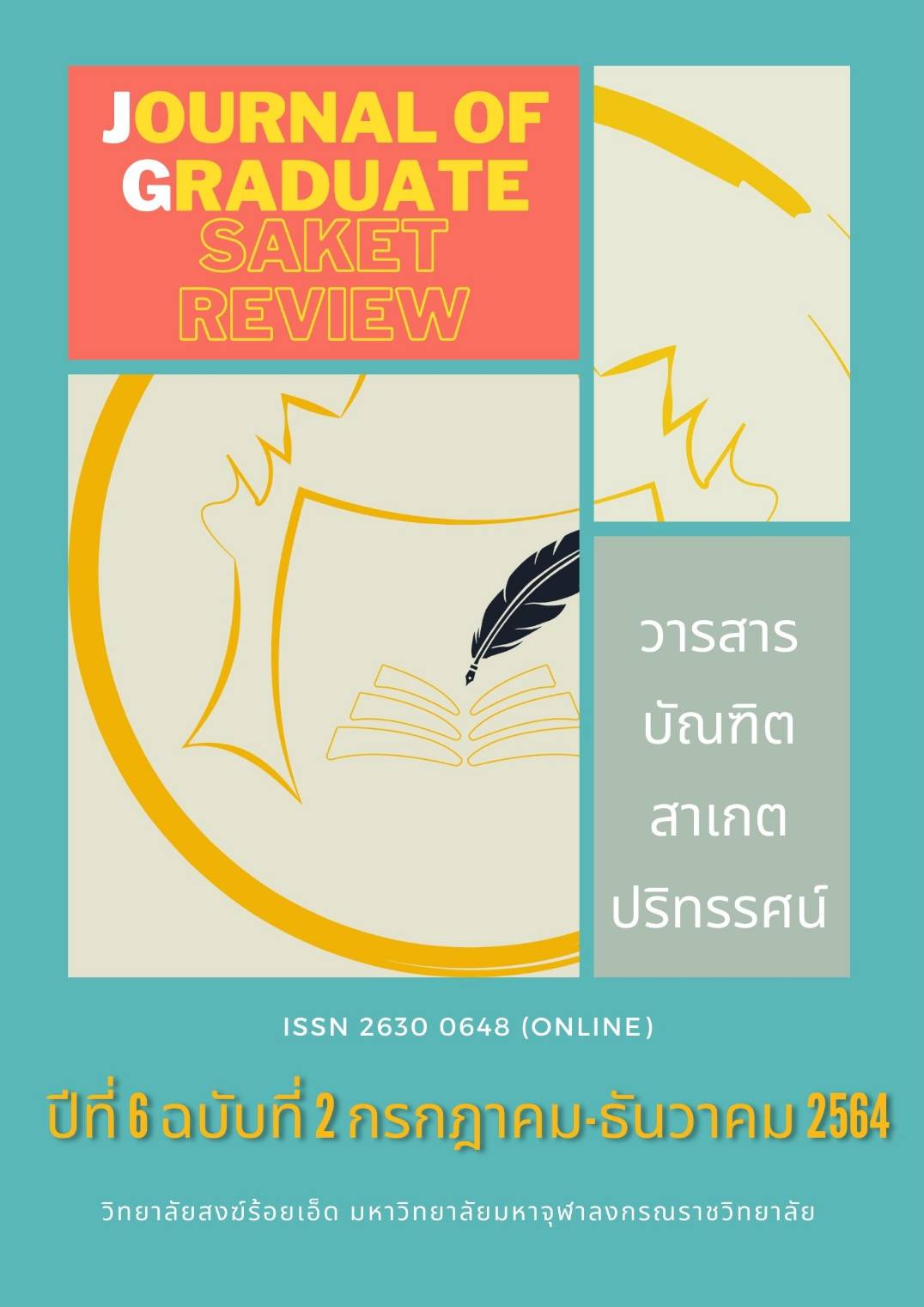สภาพปัจจุบัน สภาพที่พึงประสงค์และความต้องการจำเป็นในการพัฒนาพฤติกรรมเชิงจริยธรรมของบุคลากรโรงเรียนพระปริยัติธรรม แผนกสามัญศึกษา จังหวัดศรีสะเกษ โรงเรียนในโครงการตามพระราชดำริ
Main Article Content
บทคัดย่อ
บทคัดย่อ
การวิจัยในครั้งนี้เป็นการวิจัยเชิงสำรวจ (Survey Research) มีวัตถุประสงค์เพื่อศึกษาสภาพปัจจุบัน สภาพที่พึงประสงค์และความต้องการจำเป็น รวมทั้งศึกษาแนวทางในการพัฒนาพฤติกรรมเชิงจริยธรรมของบุคลากรโรงเรียนพระปริยัติธรรมฯ จังหวัดศรีสะเกษ ในโครงการตามพระราชดำริ ผู้วิจัยเก็บรวบรวมข้อมูลโดยใช้แบบสอบถาม ซึ่งมีประชากรและกลุ่มตัวอย่างคือ ผู้บริหารสถานศึกษาและครูผู้สอนในโรงเรียนพระปริยัติธรรมฯ จังหวัดศรีสะเกษ ด้วยวิธีการการสุ่มตัวอย่างแบบแบ่งชั้น (Stratified Random Sampling) จำนวน 103 รูป/คน ใน 8 ด้าน ได้แก่ 1) ด้านความศรัทธา 2) ด้านความมุ่งมั่น 3) ด้านความเมตตากรุณา 4) ด้านความรับผิดชอบ 5) ด้านความเพียร 6) ด้านความซื่อสัตย์ 7) ด้านระเบียบวินัย และ8) ด้านความพอเพียง วิเคราะห์ข้อมูลโดยการหาค่าเฉลี่ย () ส่วนเบี่ยงเบนมาตรฐาน (S.D.) และค่าดัชนีที่จัดเรียงลำดับความต้องการจำเป็น (PNImodified)
ผลการวิจัยพบว่า
1) สภาพปัจจุบันในการพัฒนาพฤติกรรมเชิงจริยธรรมของบุคลากรอยู่ในระดับมาก โดยด้านที่มีค่าเฉลี่ยสูงสุด ได้แก่ ด้านความศรัทธา รองลงมาด้านความมุ่งมั่น และด้านที่มีค่าเฉลี่ยต่ำสุด ได้แก่ ด้านความเมตตากรุณาและด้านความรับผิดชอบ ส่วนสภาพที่พึงประสงค์อยู่ในระดับมากที่สุด โดยด้านที่มีค่าเฉลี่ยสูงสุด ได้แก่ ด้านระเบียบวินัย รองลงมาด้านความรับผิดชอบและด้านความเพียร และด้านที่มีค่าเฉลี่ยต่ำที่สุด ได้แก่ ด้านความมุ่งมั่น และเมื่อจัดเรียงลำดับความต้องการจำเป็นพบว่า ด้านที่มีค่าดัชนีความต้องการจำเป็นสูงสุด คือ ด้านความรับผิดชอบ รองลงมาด้านความเมตตากรุณาและด้านความเพียร และด้านที่มีค่าดัชนีความต้องการจำเป็นน้อยที่สุด ได้แก่ ด้านความศรัทธา ตามลำดับ
2) แนวทางในการพัฒนาพฤติกรรมเชิงจริยธรรมของบุคลากร โดยจัดทำโครงการพัฒนาพฤติกรรมเชิงจริยธรรม ได้แก่ การสร้างกระบวนการศึกษาเรียนรู้ถึงหลักของพฤติกรรมเชิงจริยธรรม ให้เกิดความเข้าใจ (ปริยัติ) กิจกรรมการฝึกตนเป็นการปฏิบัติตามหลักจริยธรรม ความเชื่อที่ตนนับถือ (ปฏิบัติ) และกระบวนการในการวิเคราะห์ตนเองเพื่อทบทวน ตระหนักรู้ถึงคุณค่า และความสำคัญในตนเองเกี่ยวกับพฤติกรรมเชิงจริยธรรม (ปฏิเวธ) เพื่อเป็นแนวทางในการพัฒนาพฤติกรรมเชิงจริยธรรมแห่งเรียนรู้และฝึกปฏิบัติตามศักยภาพและโอกาสของบุคลากรสถานศึกษา
Article Details
เนื้อหาและข้อมูลในบทความที่ลงตีพิมพ์ในวารสารบัณฑิตสาเกตปริทรรศน์ ถือเป็นข้อคิดเห็นและความรับผิดชอบของผู้เขียนบทความโดยตรงซึ่งกองบรรณาธิการวารสาร ไม่จำเป็นต้องเห็นด้วย หรือร่วมรับผิดชอบใด ๆบทความ ข้อมูล เนื้อหา รูปภาพ ฯลฯ ที่ได้รับการตีพิมพ์ในวารสารบัณฑิตสาเกตปริทรรศน์ ถือเป็นลิขสิทธิ์ของวารสารบัณฑิตสาเกตปริทรรศน์ หากบุคคลหรือหน่วยงานใดต้องการนำทั้งหมดหรือส่วนหนึ่งส่วนใดไปเผยแพร่ต่อหรือเพื่อกระทำการใด ๆ จะต้องได้รับอนุญาตเป็นลายลักอักษรจากวารสารบัณฑิตสาเกตปริทรรศน์ ก่อนเท่านั้น
เอกสารอ้างอิง
เอกสารอ้างอิง
บุญชู แสงสุข. (2544). ทรรศนะของบุคลากรทางการศึกษา ที่มีต่อการปฏิบัติจริงตามคุณธรรมและจริยธรรมของผู้บริหารสถานศึกษา. วิทยานิพนธ์ปริญญามหาบัณฑิต มหาวิทยาลัยนเรศวร.
มาประเสริฐ มาลี. (2556). การปฏิบัติตามหลักกัลยาณมิตรของผู้บริหารสถานศึกษาและครูผู้สอน สังกัดสำนักงานเขตพื้นที่การศึกษาประถมศึกษา เพชรบูรณ์ เขต 3. วิทยานิพนธ์ปริญญามหาบัณฑิต มหาวิทยาลัยราชภัฏเทพสตรี.
วริยา ชินวรรโณ. (2546). จริยธรรมในวิชาชีพ. กรุงเทพ : โรงพิมพ์ชวนพิมพ์.
วิมุต หยกพรายพันธ์. (2544). พฤติกรรมคุณธรรมของผู้บริหารโรงเรียนมัธยมศึกษาสังกัดกรมสามัญศึกษา. วิทยานิพนธ์ปริญญามหาบัณฑิต สถาบันราชภัฏนครปฐม.
สุรัตน์ มุ่งอิงกลาง. (2544). การศึกษาคุณธรรมตามแนวพุทธธรรมของผู้บริหารโรงเรียนประถมศึกษา สังกัดสำนักงานการประถมศึกษาจังหวัดนครราชสีมา. วิทยานิพนธ์การบริหารการศึกษา, บัณฑิตวิทยาลัย: มหาวิทยาลัยราชภัฏนครราชสีมา.
สุวิมล ติรกานันท์. (2545). การประเมินผู้บริหารสถานศึกษาด้านคุณธรรม จริยธรรมและการเป็นแบบอย่างที่ดี. วารสารสถาบันพัฒนาผู้บริหารการศึกษา, 19 (4)
อาคม มากมีทรัพย์. (2557). จริยธรรมผู้บริหารสถานศึกษา. วิทยานิพนธ์ของบัณฑิตวิทยาลัย มหาวิทยาลัยศิลปากร.
Jewell, Paul. (2001). Measuring moral development: Feeling, thinking, and doing. Dissertation Abstracts International, 9(30), 646.
Nicolai, P. (1971). Food and time resource partitioning into existing latest species. Odonatological, (13), 3214-A.
Stadt, R.W. (1974). Managing career education program. New Jersey: Prentice-Hall.


